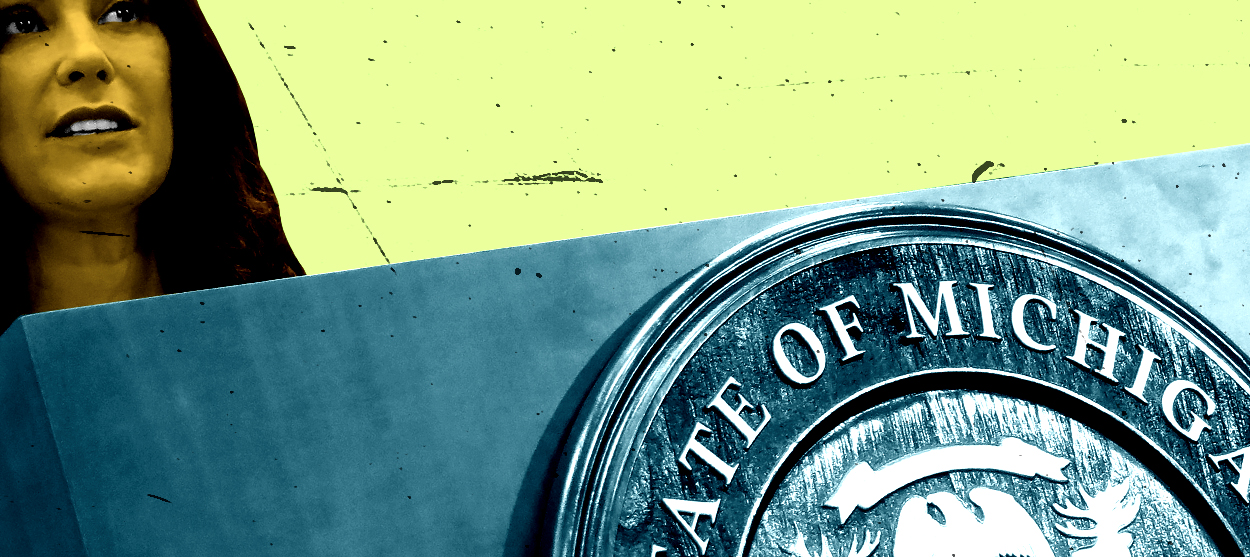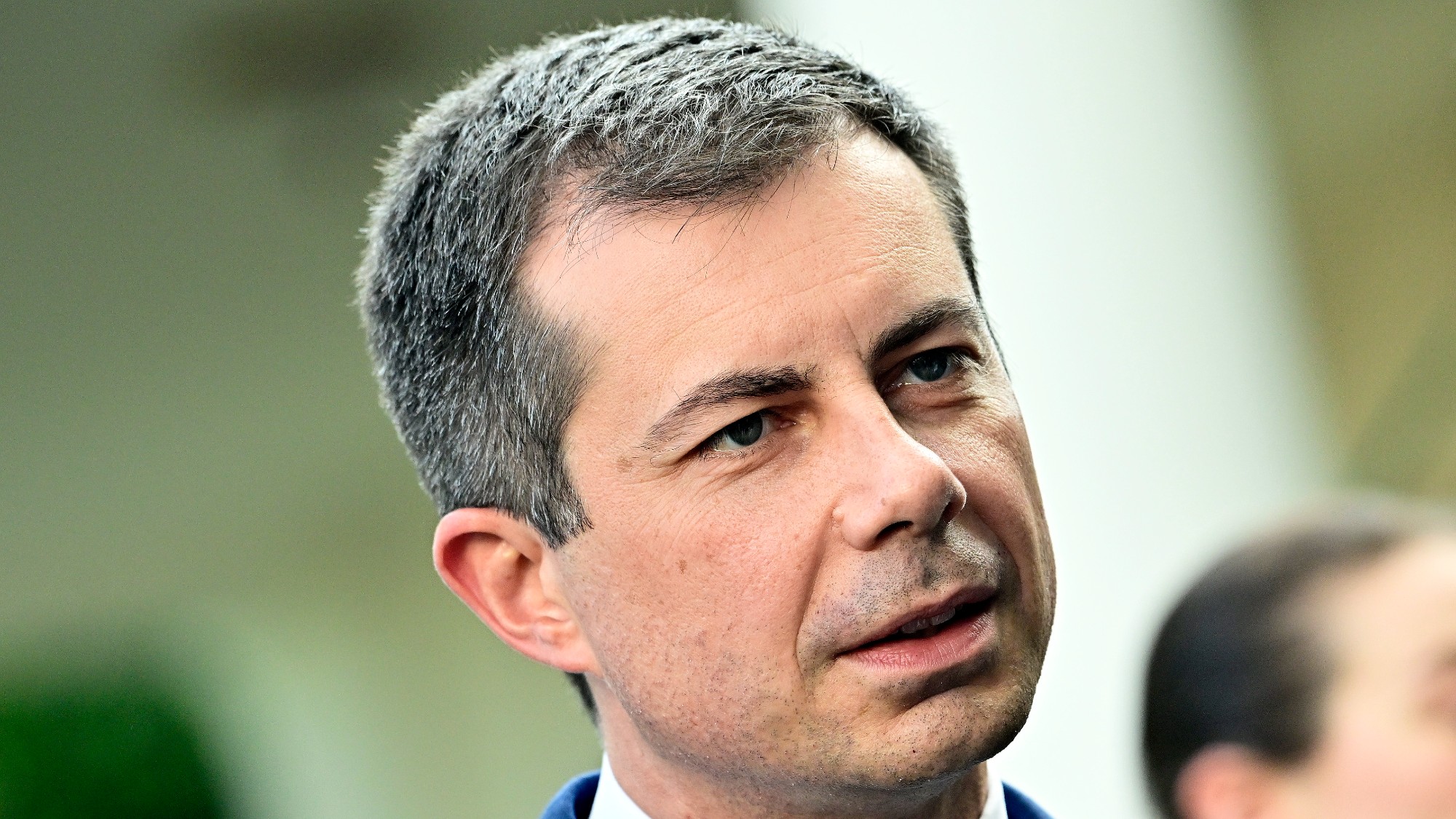Gretchen Whitmer's pandemic competence is a mirage
She's a liberal media darling, but what has she actually done?


A free daily email with the biggest news stories of the day – and the best features from TheWeek.com
You are now subscribed
Your newsletter sign-up was successful
With the possible exception of Governor Andrew Cuomo in New York, who would much rather have you talk about Donald Trump's numerous iniquities than how he has handled unemployment in his state, no Democratic politician has been more ubiquitous in recent weeks than Gretchen Whitmer, the governor of Michigan. (This includes Joe Biden, who is apparently running for president or something.) Barely a day has passed during the 'rona season when Whitmer has not appeared on a morning or late-night show to dispense pseudo-folksy wisdom and vague emotive criticism of the president.
For certain audiences, Whitmer is becoming a Midwestern liberal icon, equal parts Marge Gunderson and Wendy Davis. For others she sounds like a jumped-up middle school student council vice president trying desperately to control how her fellow students express their school spirit. Your proverbial mileage may vary.
What is not in dispute is the reality for Michiganders of how Whitmer has governed since the pandemic began. So far from being a tough-minded no-nonsense crisis manager, she has publicly auditioned for the vice presidency while the state unemployment website has been a non-functioning mess for the at least one million Michiganders who are out of work; last Monday it went down altogether, apparently because no one in Lansing thought to anticipate heavier volume. Whitmer's recent executive order prohibiting the sale of various home goods in stores that otherwise remain open suggests that she is more concerned with preventing Michiganders from buying garden gnomes (and earning much-needed income doing risk-free landscaping work) than she is with ensuring that they have access to benefits. She has also somehow found time to sign one order suspending the state's Open Meetings Act, which requires public bodies to notify citizens when meetings are being held and allow them to attend, and another that permits state agencies to twiddle their thumbs in response to information requests from journalists. In both cases this effectively mutes the ability of the press to report on her flailing response to the crisis.
The Week
Escape your echo chamber. Get the facts behind the news, plus analysis from multiple perspectives.

Sign up for The Week's Free Newsletters
From our morning news briefing to a weekly Good News Newsletter, get the best of The Week delivered directly to your inbox.
From our morning news briefing to a weekly Good News Newsletter, get the best of The Week delivered directly to your inbox.
I am not suggesting that the failure of things like online unemployment portals is solely the fault of Whitmer. But ask yourself whether the same allowances would be made for other politicians. If it is not her responsibility to fix these problems after she has assumed unilateral authority over her state, whose is it? The buck stops with her, not with bureaucrats and programmers whose names we will never know.
None of this will be remotely surprising to many Michiganders. Despite handily beating Bill Schuette, the unpopular former Republican attorney general, in 2018, Whitmer's approval ratings have been consistently low, especially outside the Detroit metro area. The response to many of her policies has been similar. A 45-cent-per-gallon gas tax increase that would have made fuel more expensive in Michigan anywhere else in the country was rejected by the legislature even though she insisted that it was necessary for the maintenance of roads (Michigan already spends far more money relative to its population and the size of its road system than many states whose highways are in better shape, such as Minnesota). She has also needlessly antagonized abortion opponents in one of the Midwest's most socially conservative states by promising to veto pro-life legislation and slashing funding for crisis pregnancy centers that provided ultrasounds, counseling, and other services to pregnant women. Instead of a no-nonsense, down-to-earth problem solver focused on pocketbook issues, Whitmer has governed more or less the way you would expect someone who keeps Ruth Bader Ginsberg "prayer" candles on her desk would.
On Wednesday, April 15, thousands of protesters gathered in Lansing to express their disapproval of Whitmer's handling of the crisis. (The ones with Confederate flags should be deported to Alabama or, worse, Ohio.) In the national media the protests were either dismissed as farcical or else held up as examples of this state's deep-seated misogyny (no one has ever protested male politicians, apparently). Whitmer's initial response was to suggest that people who "don't like to be in this stay-at-home order" might "have just created a need to lengthen it," which made her sound like a cartoon villain. Almost immediately after Trump signaled his support for the protests on Twitter, Whitmer suddenly announced that she planned to begin re-opening parts of the state on May 1. This is a stark reversal of course, not only from the heavy-handedness of her recent executive order but from her earlier attempt to extend her emergency powers through early June. What has changed in the space of a few days that justifies such a radical departure: the science or Whitmer's resolve in the face of disapproval that clearly extends far beyond Tea Partiers (who are not very numerous in the Wolverine State)? If, as many of us fully expect, a May re-opening does not lead to the deaths of hundreds of thousands of Michiganders, her previous suggestion of immiserating the state until the middle of the following month will seem at best ill-considered, at worst callous. This is not strong leadership under pressure. It is desperation.
Only a week ago, 71 percent of Michiganders supported Whitmer's handling of the pandemic. By Monday this had dropped to 57 percent. This is what free fall looks like. Her recent about-face may prevent her numbers from declining more steeply. But it is unlikely to prevent the presidential election in Michigan from becoming a referendum on Whitmer. It is still too early to say whether this will be a good thing for her party. Somehow, though, I doubt we will be seeing her on the national Democratic ticket.
A free daily email with the biggest news stories of the day – and the best features from TheWeek.com
Want more essential commentary and analysis like this delivered straight to your inbox? Sign up for The Week's "Today's best articles" newsletter here.
Matthew Walther is a national correspondent at The Week. His work has also appeared in First Things, The Spectator of London, The Catholic Herald, National Review, and other publications. He is currently writing a biography of the Rev. Montague Summers. He is also a Robert Novak Journalism Fellow.
-
 6 exquisite homes with vast acreage
6 exquisite homes with vast acreageFeature Featuring an off-the-grid contemporary home in New Mexico and lakefront farmhouse in Massachusetts
-
 Film reviews: ‘Wuthering Heights,’ ‘Good Luck, Have Fun, Don’t Die,’ and ‘Sirat’
Film reviews: ‘Wuthering Heights,’ ‘Good Luck, Have Fun, Don’t Die,’ and ‘Sirat’Feature An inconvenient love torments a would-be couple, a gonzo time traveler seeks to save humanity from AI, and a father’s desperate search goes deeply sideways
-
 Political cartoons for February 16
Political cartoons for February 16Cartoons Monday’s political cartoons include President's Day, a valentine from the Epstein files, and more
-
 The billionaires’ wealth tax: a catastrophe for California?
The billionaires’ wealth tax: a catastrophe for California?Talking Point Peter Thiel and Larry Page preparing to change state residency
-
 Bari Weiss’ ‘60 Minutes’ scandal is about more than one report
Bari Weiss’ ‘60 Minutes’ scandal is about more than one reportIN THE SPOTLIGHT By blocking an approved segment on a controversial prison holding US deportees in El Salvador, the editor-in-chief of CBS News has become the main story
-
 Has Zohran Mamdani shown the Democrats how to win again?
Has Zohran Mamdani shown the Democrats how to win again?Today’s Big Question New York City mayoral election touted as victory for left-wing populists but moderate centrist wins elsewhere present more complex path for Democratic Party
-
 Millions turn out for anti-Trump ‘No Kings’ rallies
Millions turn out for anti-Trump ‘No Kings’ ralliesSpeed Read An estimated 7 million people participated, 2 million more than at the first ‘No Kings’ protest in June
-
 Ghislaine Maxwell: angling for a Trump pardon
Ghislaine Maxwell: angling for a Trump pardonTalking Point Convicted sex trafficker's testimony could shed new light on president's links to Jeffrey Epstein
-
 The last words and final moments of 40 presidents
The last words and final moments of 40 presidentsThe Explainer Some are eloquent quotes worthy of the holders of the highest office in the nation, and others... aren't
-
 13 potential 2028 presidential candidates for both major parties
13 potential 2028 presidential candidates for both major partiesIn Depth A rare open primary for both parties has a large number of people considering a run for president
-
 The JFK files: the truth at last?
The JFK files: the truth at last?In The Spotlight More than 64,000 previously classified documents relating the 1963 assassination of John F. Kennedy have been released by the Trump administration
